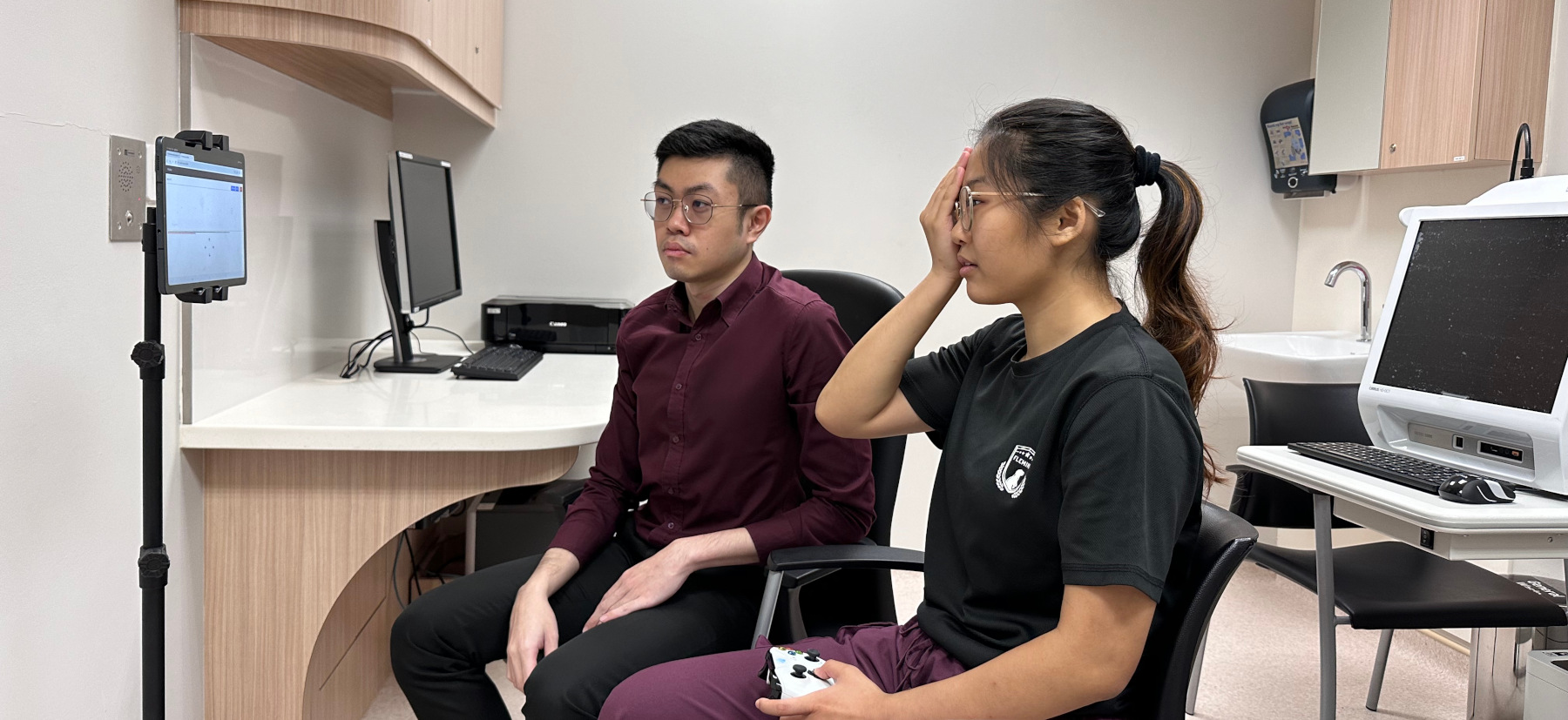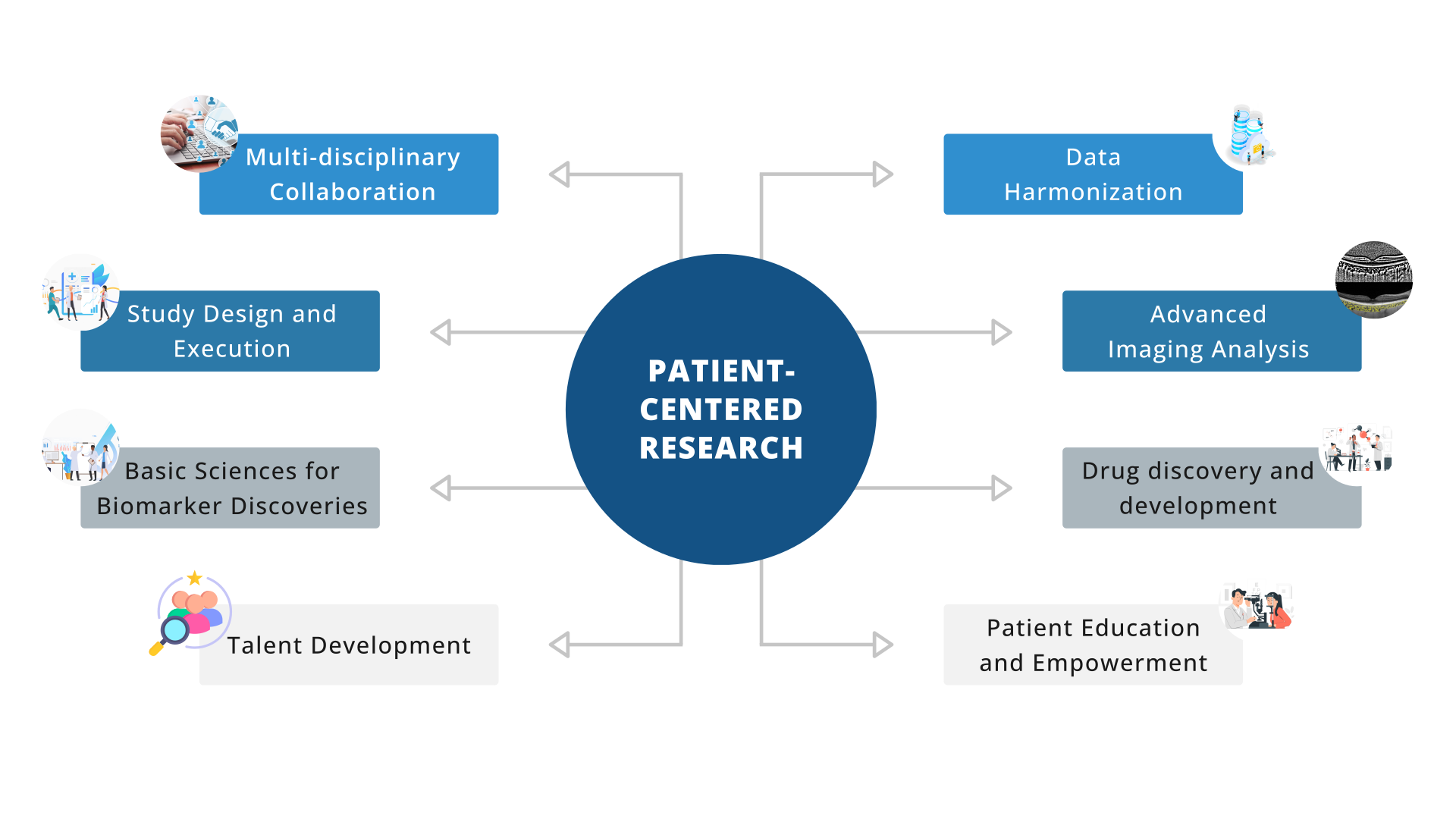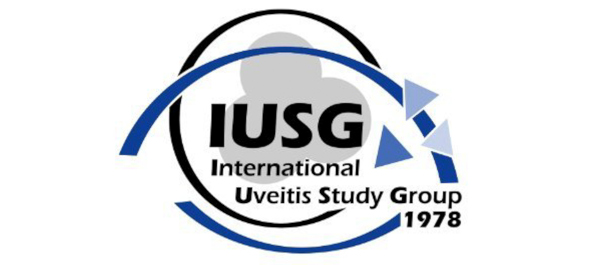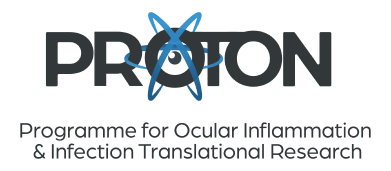
Dedicated to Excellence in Ocular Inflammation & Infection Research
Our Mission
PROTON is committed to advancing research and innovation in ocular inflammatory and infectious diseases (OIID) in Singapore. Collaborating with local and international partners, our mission is to pioneer breakthroughs in basic science, clinical applications, and novel therapeutics for the detection, treatment, and prevention of OIID.
Our Vision
We aspire to be a global hub for OIID research, pioneering advancements in understanding, diagnostics, and tailored interventions. Focused on interdisciplinary collaboration, academic excellence, and talent development, we strive to revolutionize the landscape of OIID on a global scale.

What we do ?

Join us as we continue to push the boundaries of what is possible, fueled by our dedication to improving the lives of patients around the globe.
Frequently Asked Questions (FAQs)
PROTON (Program for Ocular Inflammation and Infection Translational Research) focuses on several key areas of research related to uveitis. These include:
- Etiology and Pathogenesis: Investigating the underlying causes and mechanisms of uveitis, including autoimmune responses, infectious agents, genetic predisposition, and environmental factors.
- Diagnosis and Biomarkers: Developing novel diagnostic tools and biomarkers for early detection, accurate diagnosis, and monitoring of uveitis progression and treatment response.
- Treatment Strategies: Exploring new therapeutic approaches, including pharmacological interventions, immunomodulatory therapies, and surgical techniques, aimed at improving outcomes and reducing complications associated with uveitis.
- Disease Classification and Phenotyping: Refining disease classification systems and characterizing uveitis subtypes based on clinical manifestations, disease severity, response to treatment, and prognosis.
- Patient Outcomes and Quality of Life: Assessing the impact of uveitis on patients' quality of life, functional visual outcomes, psychological well-being, and healthcare utilization, with a focus on optimizing patient care and support services.
To participate in PROTON research studies, start by checking your eligibility. Research studies often have specific criteria based on factors such as age, medical history, and type or severity of uveitis. Keep an eye on PROTON's website or other platforms where they announce ongoing research studies. This could include clinical trial registries, academic institutions' websites, or research databases. If you find a study that interests you and for which you meet the eligibility criteria, reach out to the research team at contact@protonstudy.org. Contact information for study coordinators or principal investigators is typically provided in study announcements. You can email or call them to express your interest and inquire about participation. If the research team determines that you are potentially eligible, they will conduct a screening process to confirm your eligibility. This may involve medical history reviews, physical exams, and diagnostic tests. If you're deemed eligible and still interested, you'll be asked to provide informed consent before participating in the study. Depending on the specific study protocol, participation may involve various activities such as undergoing specific medical procedures, receiving treatments or interventions, completing questionnaires or surveys, and attending follow-up appointments. Make sure you understand the time commitment and requirements before consenting to participate. After participating in the study, you may be asked to attend follow-up appointments or provide feedback on your experience.
In addition to participating in ongoing research studies, you can also contribute to PROTON's efforts by suggesting new ideas for research studies. PROTON values input from the uveitis community, including patients, caregivers, and healthcare professionals. If you have ideas for new research studies or areas of investigation that you believe could benefit the field of uveitis research, don't hesitate to share them with the research team at contact@protonstudy.org. Your insights and perspectives can help shape future research directions and priorities, ultimately contributing to the advancement of knowledge and improvements in uveitis care. You can reach out to the research team or participate in patient advisory groups to provide input and collaborate on the development of research initiatives. Your contributions can make a meaningful impact on the research landscape and the lives of individuals affected by uveitis.
Collaborating with PROTON can offer several opportunities for individuals, organizations, and institutions interested in advancing uveitis research and improving patient care. Here are some potential collaboration opportunities:
- Research Collaboration: Researchers and clinicians can collaborate with PROTON on joint research projects aimed at addressing key questions in uveitis etiology, pathogenesis, diagnosis, treatment, and outcomes. Collaborative research efforts may involve sharing expertise, resources, and data to accelerate discoveries and translate findings into clinical practice.
- Clinical Trials and Studies: Pharmaceutical companies, biotech firms, and academic institutions developing new therapies or interventions for uveitis may collaborate with PROTON to conduct clinical trials and studies. By partnering with PROTON, sponsors can access a network of experienced investigators, patient populations, and research infrastructure to facilitate efficient and rigorous clinical research.
- Data Sharing and Analysis: PROTON may collaborate with other research consortia, registries, and data-sharing initiatives to exchange anonymized clinical data, biological samples, and imaging data for secondary analysis. By pooling resources and harmonizing datasets, collaborators can gain insights into uveitis epidemiology, disease heterogeneity, treatment outcomes, and long-term prognosis.
- Education and Training: Collaborators can contribute to PROTON's educational initiatives by organizing workshops, symposia, and training programs on uveitis-related topics. By sharing knowledge and expertise, collaborators can help build capacity among healthcare professionals, researchers, and trainees, ultimately improving uveitis care and research worldwide.
- Patient Engagement and Advocacy: Patient advocacy groups, patient-centered organizations, and individuals affected by uveitis can collaborate with PROTON to raise awareness, advocate for research funding, and promote patient-centered research priorities. By engaging patients and caregivers as partners in research, collaborators can ensure that research efforts are relevant, inclusive, and responsive to the needs of the uveitis community.
- Technology and Innovation: Collaborators from the technology sector, including companies developing digital health solutions, imaging technologies, and artificial intelligence algorithms, can collaborate with PROTON to innovate and improve diagnostic tools, monitoring devices, and treatment modalities for uveitis. By leveraging cutting-edge technologies, collaborators can enhance the precision, efficiency, and accessibility of uveitis care.
- Global Partnerships: PROTON may collaborate with international research institutions, professional societies, and government agencies to foster global partnerships and address uveitis challenges that transcend geographical boundaries. Collaborators can contribute diverse perspectives, expertise, and resources to tackle uveitis disparities, standardize clinical practices, and promote equitable access to care.
Overall, collaborating with PROTON offers a platform for multidisciplinary collaboration, innovation, and impact in the field of uveitis research and clinical care. Collaborators interested in exploring partnership opportunities with PROTON are encouraged to reach out to the research team to discuss potential collaborations and shared objectives.
Yes, PROTON often offers research resources and hosts public seminars as part of its efforts to advance uveitis research and engage with the broader community. Here's how PROTON typically provides these resources:
- Research Resources: PROTON may provide various research resources to support investigators, clinicians, and trainees in their uveitis research endeavors. These resources may include access to clinical datasets, biological samples, imaging databases, and research protocols. By facilitating access to these resources, PROTON aims to enhance the efficiency and quality of uveitis research and promote collaboration among researchers and institutions.
- Public Seminars and Educational Events: PROTON organizes public seminars, workshops, and educational events to disseminate knowledge, raise awareness, and foster dialogue on uveitis-related topics. These events may feature presentations by leading experts in the field, discussions on recent advances in uveitis research and clinical practice, and opportunities for networking and collaboration. By hosting public seminars, PROTON aims to educate healthcare professionals, patients, caregivers, and the general public about uveitis, its management, and the latest research developments.
- Online Resources and Webinars: In addition to in-person seminars, PROTON may offer online resources and webinars to reach a wider audience and accommodate diverse learning preferences. These resources may include recorded presentations, webinars on specific uveitis topics, educational videos, and downloadable materials. By providing online resources and webinars, PROTON enables individuals to access educational content conveniently and stay informed about uveitis research and clinical advancements.
- Collaborative Research Platforms: PROTON may also establish collaborative research platforms, such as online forums, research networks, and virtual communities, to facilitate communication, knowledge exchange, and collaboration among researchers, clinicians, and stakeholders interested in uveitis. These platforms provide opportunities for researchers to share research findings, discuss challenges, seek feedback, and identify potential collaborators for future research projects.
Overall, PROTON's provision of research resources and public seminars reflects its commitment to advancing uveitis research, promoting knowledge dissemination, and fostering collaboration within the scientific community and beyond. Individuals interested in accessing research resources or participating in public seminars hosted by PROTON can visit its website or contact the research team for more information.
Supporting PROTON's research efforts can be incredibly valuable, whether you're a clinician, scientist, patient, or community partner. Here are several ways you can contribute:
- Participate in Research Studies: Consider participating in PROTON's ongoing research studies or collaborating on new research projects. Your expertise and insights can help advance knowledge and improve outcomes for patients with uveitis.
- Refer Patients: Refer eligible patients to PROTON's research studies or clinical trials. By referring patients, you can help accelerate recruitment efforts and facilitate the development of new treatments and therapies.
- Contribute Expertise: Share your clinical expertise, research findings, and best practices with PROTON's research team. Collaborate on study design, data analysis, manuscript preparation, or educational initiatives to enhance the quality and impact of uveitis research.
- Provide Resources: Offer access to clinical facilities, research infrastructure, or funding opportunities to support PROTON's research endeavors. Your resources and support can enable the implementation of innovative research projects and the translation of research findings into clinical practice.
- Participate in Research: Consider participating in PROTON's research studies or clinical trials as a patient participant. Your involvement can contribute valuable data and insights to advance uveitis research and improve treatment options for future patients.
- Share Your Experience: Share your uveitis journey and experiences with PROTON's research team. Provide feedback on research priorities, study design, and patient-centered outcomes to ensure that research efforts are aligned with patient needs and preferences.
- Raise Awareness: Raise awareness about uveitis and the importance of research within your community. Share information about PROTON's research initiatives, educational resources, and opportunities for patient involvement through social media, support groups, or community events.
- Advocate for Funding: Advocate for increased funding for uveitis research at local, national, and international levels. By raising awareness about the impact of uveitis and the need for research investment, you can help secure resources to support PROTON's research initiatives and improve patient care.
- Collaborate on Outreach: Collaborate with PROTON on community outreach and education initiatives. Partner with PROTON to organize public seminars, workshops, or awareness campaigns to educate the community about uveitis, its risk factors, and treatment options.
- Support Fundraising Efforts: Support PROTON's fundraising efforts to secure resources for uveitis research. Consider organizing fundraising events, seeking corporate sponsorships, or making donations to support PROTON's research initiatives and patient support programs.
- Facilitate Partnerships: Facilitate partnerships between PROTON and other community organizations, healthcare providers, or research institutions. By fostering collaborations and knowledge exchange, you can enhance the impact and sustainability of PROTON's research efforts.
- Advocate for Policy Change: Advocate for policies that prioritize uveitis research, patient care, and access to treatments. Work with policymakers, advocacy groups, and healthcare organizations to raise awareness about uveitis-related issues and advocate for policy changes that support research and patient needs.
Regardless of your role, your support and contributions can make a meaningful difference in advancing uveitis research, improving patient care, and ultimately, enhancing the lives of individuals affected by uveitis. Reach out to PROTON's research team to discuss potential collaboration opportunities and ways to get involved.
PROTON is endorsed by 








